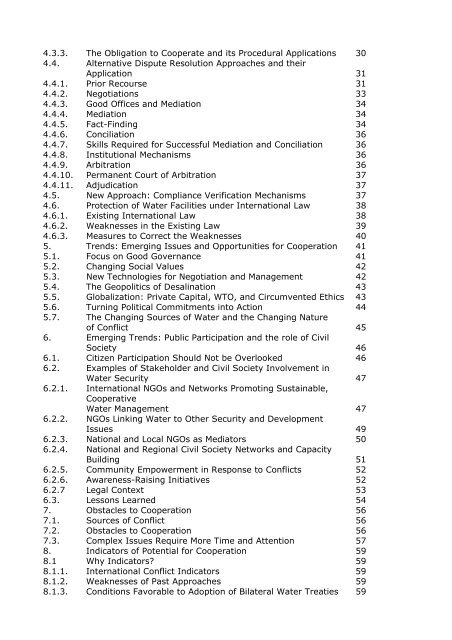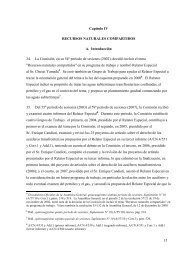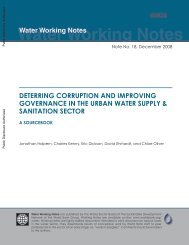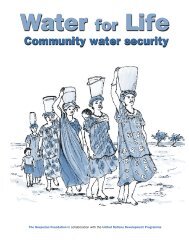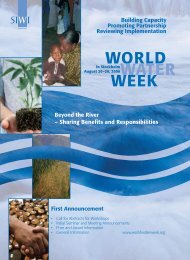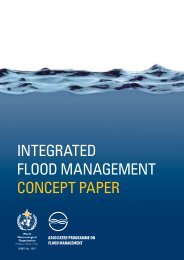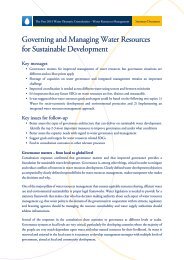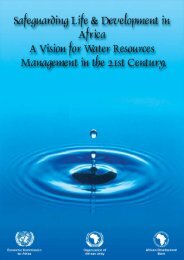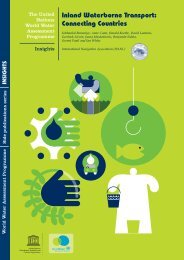Water security and peace: a synthesis of studies ... - unesdoc - Unesco
Water security and peace: a synthesis of studies ... - unesdoc - Unesco
Water security and peace: a synthesis of studies ... - unesdoc - Unesco
Create successful ePaper yourself
Turn your PDF publications into a flip-book with our unique Google optimized e-Paper software.
4.3.3. The Obligation to Cooperate <strong>and</strong> its Procedural Applications 30<br />
4.4. Alternative Dispute Resolution Approaches <strong>and</strong> their<br />
Application 31<br />
4.4.1. Prior Recourse 31<br />
4.4.2. Negotiations 33<br />
4.4.3. Good Offices <strong>and</strong> Mediation 34<br />
4.4.4. Mediation 34<br />
4.4.5. Fact-Finding 34<br />
4.4.6. Conciliation 36<br />
4.4.7. Skills Required for Successful Mediation <strong>and</strong> Conciliation 36<br />
4.4.8. Institutional Mechanisms 36<br />
4.4.9. Arbitration 36<br />
4.4.10. Permanent Court <strong>of</strong> Arbitration 37<br />
4.4.11. Adjudication 37<br />
4.5. New Approach: Compliance Verification Mechanisms 37<br />
4.6. Protection <strong>of</strong> <strong>Water</strong> Facilities under International Law 38<br />
4.6.1. Existing International Law 38<br />
4.6.2. Weaknesses in the Existing Law 39<br />
4.6.3. Measures to Correct the Weaknesses 40<br />
5. Trends: Emerging Issues <strong>and</strong> Opportunities for Cooperation 41<br />
5.1. Focus on Good Governance 41<br />
5.2. Changing Social Values 42<br />
5.3. New Technologies for Negotiation <strong>and</strong> Management 42<br />
5.4. The Geopolitics <strong>of</strong> Desalination 43<br />
5.5. Globalization: Private Capital, WTO, <strong>and</strong> Circumvented Ethics 43<br />
5.6. Turning Political Commitments into Action 44<br />
5.7. The Changing Sources <strong>of</strong> <strong>Water</strong> <strong>and</strong> the Changing Nature<br />
<strong>of</strong> Conflict 45<br />
6. Emerging Trends: Public Participation <strong>and</strong> the role <strong>of</strong> Civil<br />
Society 46<br />
6.1. Citizen Participation Should Not be Overlooked 46<br />
6.2. Examples <strong>of</strong> Stakeholder <strong>and</strong> Civil Society Involvement in<br />
<strong>Water</strong> Security 47<br />
6.2.1. International NGOs <strong>and</strong> Networks Promoting Sustainable,<br />
Cooperative<br />
<strong>Water</strong> Management 47<br />
6.2.2. NGOs Linking <strong>Water</strong> to Other Security <strong>and</strong> Development<br />
Issues 49<br />
6.2.3. National <strong>and</strong> Local NGOs as Mediators 50<br />
6.2.4. National <strong>and</strong> Regional Civil Society Networks <strong>and</strong> Capacity<br />
Building 51<br />
6.2.5. Community Empowerment in Response to Conflicts 52<br />
6.2.6. Awareness-Raising Initiatives 52<br />
6.2.7 Legal Context 53<br />
6.3. Lessons Learned 54<br />
7. Obstacles to Cooperation 56<br />
7.1. Sources <strong>of</strong> Conflict 56<br />
7.2. Obstacles to Cooperation 56<br />
7.3. Complex Issues Require More Time <strong>and</strong> Attention 57<br />
8. Indicators <strong>of</strong> Potential for Cooperation 59<br />
8.1 Why Indicators? 59<br />
8.1.1. International Conflict Indicators 59<br />
8.1.2. Weaknesses <strong>of</strong> Past Approaches 59<br />
8.1.3. Conditions Favorable to Adoption <strong>of</strong> Bilateral <strong>Water</strong> Treaties 59


